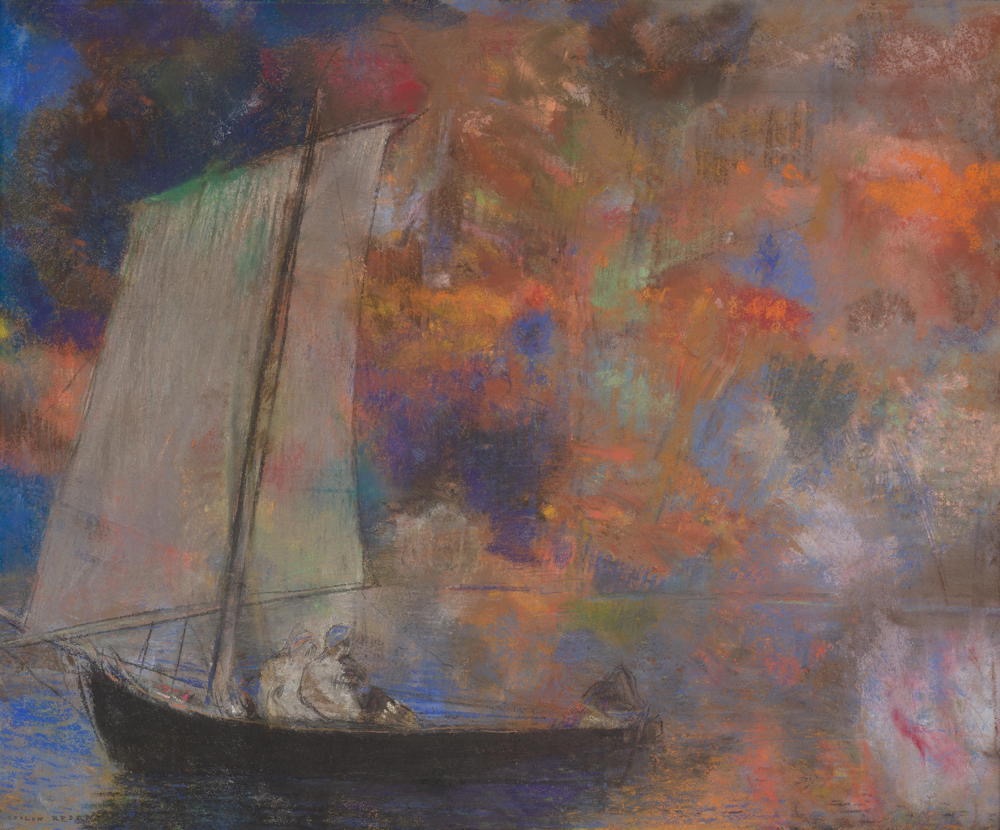Delusion

Odilon Redon: Flower Clouds (c. 1903)
" … not even Delusion could save my bacon this time around."
It might be true that every genuinely great idea began as a Delusion. The great discoveries of science often started as no more than metaphor, awfully odd-seeming combinations of concepts as yet unproven. It might also be true that if one hopes to make valuable observations, one must increase their tolerance for Delusion. Those too married to reality rarely see anything creatively, for reality drives hard bargains. It struggles to suspend its disbelief. It relies too heavily upon the familiar. It wants to know the correct answers. Delusion, on the other hand, was never that well-grounded. It makes belief rather than relying upon certified sources. It thrives on what-ifs and speculations, deferring to make its point until after it's considered its space. It understands that even a wrong foot breaks the inertia of stuckness and that movement might be more important than initial direction.
The transition back from a decently Delusional start can prove daunting. One adds constraints until some essence emerges. The grist that began the process will be crushed into an unrecognizable but more useful form. What started as wrong can always turn out better for the initial detour. I wake up each morning struggling to believe I might be a writer. Without a hint of Delusion, I might never discover the writer lurking within. I am not yet a writer before I begin, and the first paragraph or so usually relies upon the presence of some Delusion. My ritual requires that I first create my context. I must dredge up a title and a suitable image. I need to complete a little research to represent the artist's credentials and the work's source. Somehow, during all the distracting copying and pasting, I work through the initiating Delusion to eventually catch myself writing. By then, since I'm writing, I no longer require a Delusion to engage. I'm in by then.
I've noted here before that if you give a ten-year-old a guitar, he'll become a philosopher, dispensing advice without even being asked for it. Give a guy a pen or a keyboard, and something similar will happen. Suddenly, personal opinion qualifies as apt description or sage advice when it's essentially Delusion. Only some things written were really worth reading. Not every assertion should be believed. The context argues otherwise. I read and listen, primed to receive wisdom likely not embedded within. So much seems to exist just to hold some space, present but ultimately vacuous. I wish I knew, but then maybe I already do. The difference between Delusion and wisdom might prove to be infinitesimal, indiscernible. Empty for one might hold the true meaning of the universe for another, depending upon the quality of the Delusion. The necessity of the Delusion remains unquestionable.
What was I intending to say here, just the unremarkable idea that Delusion often serves as the source of useful thought? It provided motivation in the absence of anything more tangible. It might have even helped anchor the conclusion because no conclusion could have come had the Delusion not gotten it started. When Deluded, one feels as though they know. They'll later learn the depth and breadth of their initial ignorance, but that initiating burst provides helpful service while it lasts. Some mornings, I second-guess my first intentions. I get lost when trying to find my way. I take a break, hoping to find the elusive thread, and some days I never see it again. Then, the story might end like this one, with no profound learning even implied. I tried, but not even Delusion could save my bacon this time around.
©2024 by David A. Schmaltz - all rights reserved


